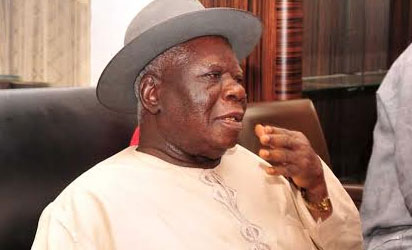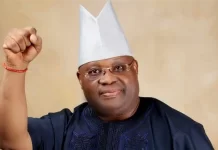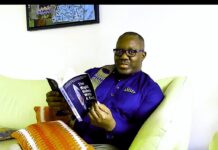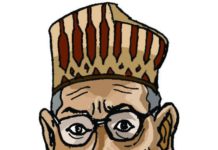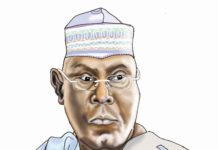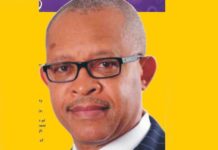Ademola Adeleke: Long walk to Osun Government House
Adeleke won in 17 local government areas of the state to beat his closest rival, Governor Oyetola who won in 13 councils.
Otiono, Nigerian Prof, elected Canadian African Studies VP
Otiono, Nigerian prof, elected Canadian African Studies VP
Tolulope Arotile: Exit of an Air Force Officer through and through
Tolulope Arotile: Exit of an Air Force Officer through and through
Wakil, the policeman who arrested Kano deputy governor
By Ishaya Ibrahim
In a Radio interview weeks before the February 23 and March 9...
The Buhari’s integrity trump card for 2019
By Ishaya Ibrahim
Buhari is not known to be personally corrupt. He rode to power in 2015 on that premise.
His supporters say they are inspired...
Atiku’s talisman on fixing Nigeria’s economy
By Ishaya Ibrahim
The set-piece for the contest of the 2019 presidential election is the economy.
The Washington based Brooklyn Institute has already determined that when...
Emeka Okwuosa: Celebrating a philanthropist @ 57
By Nduka Uzuakpundu
In our country, Nigeria, where integrity and accountability are highly needed to boost the quality of public life and drive the affairs...
Moghalu: Riding high on ideas for 2019
By Ishaya Ibrahim
Deep Dive Intelligence, a data analytical organisation, recently conducted a survey on 2019 presidential aspirants’ preparedness index. The poll showed that among...
Aminu Tambuwal: Pulling education from the brink
Worried by the low ranking of Sokoto State in matters of education in Nigeria, the governor, Aminu Waziri Tambuwal, declared a state of emergency on education in 2015 and has followed it up with a bill seeking to make education a fundamental right of every indigene, Assistant Editor, CHUKWUDI NWEJE, writes.
Sokoto State governor, Aminu Waziri Tambuwal, recently demonstrated his dissatisfaction with the state of education in his jurisdiction when he declared a state of emergency on the education in the North West state on Wednesday, October 19, 2016.
The governor initiated the Right to Education Bill 2016 in recognition and protection of the right to education of children between six and 18 years in the state. The bill is one of the major components of the policy on the state of emergency in the education sector, which Tambuwal declared in December 2015. The initiation of the bill makes Sokoto the first state in Nigeria seeking legal means to make education a fundamental human right of all children.
State of education in Sokoto
The state of education in Sokoto State is not only worrisome; it is also regrettable.
Statistics from examination bodies – West African Examination Council (WAEC) and National Examination Council (NECO) – shows that Sokoto has remained one of the states with the worst performances. For instance, in the 2014/2015 WAEC result, Sokoto scored 7.74 per cent pass with only 1,193 males and 616 females out of the 25,391 candidates that sat for the examination scoring five credits and above, including Mathematics and English.
Anambra, Abia and Edo states scored 65.92 per cent, 58.52 per cent and 57.82 per cent passes, in that order, in the same examination.
In the May/June 2016 edition of the examination, Sokoto was at the 30th position.
Cause for worry
These examination results had reached worrisome dimension before May 29, 2015 when Tambuwal took oath of office as governor of Sokoto. The implication was that Sokoto could hardly produce candidates to fill its quota in federal schools, as its indigenes fell below the minimum standards for admission into such institutions.
Thus, to redress the situation, one of the first things Tambuwal did after his inauguration was to declare a state of emergency on the education sector in December 2015. The emergency in the sector was to turn around its fortunes in the next four years.
He took it a notch further with the bill to make education a fundamental right in Sokoto.
Education as fundamental right
Chapter IV of the 1999 Constitution (as amended) guaranteed 11 basic fundamental rights for the citizenry. These are right to life, right to dignity of human persons, right to personal liberty, right to fair hearing, and right to private and family life. Others are right to freedom of thought, conscience and religion, right to freedom of expression and the press, right to peaceful assembly and association, right to freedom of movement, right to freedom from discrimination, and right to acquire and own immovable property.
These inalienable rights have done little or nothing to uplift the standards and quality of education in Sokoto which explains why Tambuwal’s bill, which is already before the House of Assembly, is seeking to add a 12th right for all persons below 18 years in the state: the right to education.
Like the late Nelson Mandela, former President of South Africa, once said, “Education is the most powerful weapon which you can use to change the world.”
Sokoto Attorney General and Commissioner for Justice, Suleiman Usman, who confirmed the initiation of the bill while fielding questions from reporters after the weekly State Executive Council (SEC) meeting in Sokoto, agreed with the notion of using education to change the state.
He said: “Sokoto will be the first state in Nigeria to provide right to education, thereby bringing it in conformity with the status of fundamental objective and directive principle of state policy under Chapter Two of the Constitution of the Federal Republic of Nigeria 1999.”
The Justice Commissioner added that the bill would consolidate the declaration of state of emergency on education by the administration in concrete terms.
Commissioner for Finance, Saidu Umar, said the state government would take extraordinary measures within a defined timeframe to achieve the desired result.
“Our objective is to improve enrolment at all stages – basic, secondary and tertiary. By the end of this programme, we will ensure that our quotas in all federal schools are filled.
“We hope to improve quality of teachers by training and retraining, and recruitment of new ones. Any teacher whose capacity did not improve after the training will be re-assigned to where his ability will be better needed.
“The ultimate aim is to improve human capital capacity in the sector, eliminate inequality in access and radically improve numeracy and literacy,” he said.
The man Tambuwal
Tambuwal was born on January 10, 1966 in Tambuwal Village in Sokoto State to Waziri Tambuwal.
He attended Tambuwal Primary School, Tambuwal, where he obtained his First School Leaving Certificate (FSLC) in 1979; and Government Teachers’ College, Dogon-Daji, where he obtained the Teachers Grade II Certificate in 1984. He then proceeded to Usman Dan Fodio University, Sokoto, where he studied Law, graduating with an LLB (Hons) degree in 1991. He completed his one-year compulsory legal studies at the Nigerian Law School, Lagos, obtained his Bachelor of Laws (BL) and was called to the Bar in 1992.
Besides his law degree, Tambuwal has also attended several courses abroad, among which are: Telecoms Regulatory Master Class – Bath UK (2004); Lawmaking for the Communications Sectors – BMIT, Johannesburg, South Africa (2004); Regulating a Competitive Industry – UK, Brussels (2005); Tulane University – International Legislative Drafting (2005); Stanford Graduate School of Business – Influence and Negotiation (2008); and KSG Harvard – Infrastructure in Market Economy (2009).
Professional affiliations
Tambuwal is member of many professional bodies, including the Nigerian Bar Association (NBA), where he was formerly Public Relations Officer, Sokoto State chapter between 1996 and 1997. He was a member of the Constitution Review Committee of the NBA (1997–1998); Sokoto branch Secretary of the NBA (1997–1998); and Assistant National Financial Secretary (1998–2000). From 2000 to 2002, he was the 1st Assistant National Secretary of the association. He is also a member of the Body of Benchers, Nigeria; International Bar Association, and the American Bar Association among others.
Political life
Tambuwal’s political life is typical of the average Nigerian politician, characterised by criss-crossing of political platforms in the pursuit of his interest. He started his political life in 1999 while working as Personal Assistant on Legislative Affairs to Senator Abdullahi Wali, the then Senate Leader. In 2003, he contested to represent the Kebbi/Tambuwal Federal Constituency and was elected into the House of Representatives on the platform of the All Nigeria Peoples Party (ANPP).
Few months to the 2007 general elections, he defected to the Democratic People’s Party (DPP), alongside the former governor of Sokoto State, Attahiru Bafarawa. When the DPP denied him the ticket to re-contest the seat of his constituency, Tambuwal returned to the ANPP, where he picked a ticket and won the election.
In 2007, when the ANPP governorship candidate for Sokoto, Aliyu Wamakko, dumped the party for the PDP, Tambuwal followed him.
On October 28, 2014, Tambuwal formally defected from the Peoples Democratic party (PDP), which was holding sway at the centre then, to the opposition All Progressives Congress (APC), and few days later his security details were withdrawn by the then Inspector General of Police, Sulieman Abba, a move that was criticised by well-meaning Nigerians as barbaric and undemocratic.
Legislative posts
Tambuwal held several offices in the House of Representatives during his eight years as a legislator. He was Minority Leader of the House from 2005, after he defected to the PDP and was re-elected to the House. In 2007, he was elected the Deputy Chief Whip.
He was a member of several committees, including the House committees on Rules and Business, Communications, Judiciary, Inter-Parliamentary, and Water Resources. He was also a member of the House Ad hoc Committee on Constitution Review. He was chairman of the ad hoc committee that reviewed the report of the controversial power probe committee headed by Ndudi Elumelu; chairman, House Sub-Committee on the Bill for an Act to Amend the Land Use Act, and acting chairman, House Committee on Power.
He was leader of the Nigerian delegation to African, Caribbean, Pacific and European Union Parliamentary Assembly (ACP-EU) and served as Vice-Chairman, Economic Committee, ACP-EU, held in Prague, Czech Republic, in April 2009.
Tambuwal contested and won the Governorship election of Sokoto on April 11, 2015 and was inaugurated on May 29, 2015.
Ibidun Ighodalo: An amazon’s uncommon gift to marriages
Maybe her own ‘childlessness’ inspired her to help childless couples smile again. Mrs. Ibidun Ighodalo’s effort at popularising IVF is not only a humanitarian...

